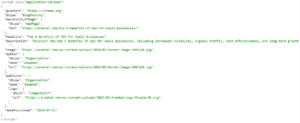What is Schema Markup And Types of Schema Markup
Discover What is Schema Markup And Types of Schema Markup to enhance your website’s SEO. Search Engine Optimization is the process of optimizing a website to improve its visibility and ranking on search engine results pages (SERPs). Schema markup, also known as structured data, is a form of microdata that webmasters can add to their HTML to improve the way search engines read and represent their page in search engine results pages (SERPs). Developed by Schema.org, a collaborative project between Google, Bing, Yahoo, and Yandex, schema markup helps search engines understand the content on your site better, which can enhance your site’s search visibility.
By using schema markup, webmasters can create rich snippets, which are brief pieces of information like reviews, events, and product prices that appear directly in SERPs. These rich snippets help users quickly understand the content of a page, leading to higher click-through rates and potentially more traffic. There are various tools to generate schema, our favorite is Schema Markup Generator
Table of Contents
ToggleBenefits of Using Schema Markup in SEO
- Improved Search Visibility: Schema markup helps search engines understand your content better, which can lead to improved indexing and visibility.
- Enhanced Rich Snippets: Rich snippets attract attention and provide users with additional information directly in SERPs, which can increase click-through rates.
- Increased Click-Through Rates (CTR): By providing users with more relevant information upfront, schema markup can lead to higher CTRs.
- Voice Search Optimization: Structured data is essential for voice search queries, as it helps search engines pull accurate information to answer questions.
- Better Content Relevance: Schema markup ensures that your content is categorized and labeled correctly, improving the relevance and accuracy of your web pages.
- Competitive Edge: Websites utilizing schema markup can stand out against competitors who are not using this SEO technique.
- Enhanced Local SEO: For local businesses, schema markup can help highlight critical information like business hours, address, and contact details.
Types of Schema Markup
Schema.org provides a comprehensive list of schema types. Below are some of the most commonly used types and their benefits:
1. Article Schema
This schema is used for news articles, blog posts, and other content articles. It helps search engines understand the content type, the headline, author, and date published.
2. Breadcrumb Schema
Breadcrumb schema provides the path of links that lead to the current page, helping users understand and navigate your site better.
3. Organization Schema:
Organization schema is used to provide detailed information about an organization, such as its name, logo, contact details, address, and social media profiles. This schema helps search engines understand and display critical information about your organization in search results, enhancing your brand’s visibility and credibility.
4. FAQ Schema
FAQ schema is used to mark up pages with frequently asked questions and their answers. This can improve your site’s chances of appearing in the “People Also Ask” sections of Google SERPs.
5. Local Business Schema
Local business schema is crucial for businesses that rely on local customers. It includes details like business name, address, opening hours, and contact information.
How to Test The Generated Schema:
To test the generated schema in SEO, use Google’s Rich Results Test or Schema Markup Validator. These tools allow you to enter your website URL or paste your schema markup code directly to check for errors and validate the implementation. They provide detailed feedback on whether the schema is correctly formatted and eligible for rich results in search engine results pages (SERPs). Regularly testing your schema ensures that it remains accurate and functional, improving your site’s chances of achieving enhanced visibility and performance in search engines.
Related Posts
May 21, 2024
Top 6 Benefits of SEO For Small Businesses
Discover the top 6 benefits of SEO for small businesses, including increased…
January 18, 2024
How to Trust your Intuition when You’re Making a Decision
When you are alone for days or weeks at a time, you eventually become drawn to…
January 18, 2024
Customer experience encompasses every aspect of business
Across sectors and regions, business leaders are recognizing the competitive…




